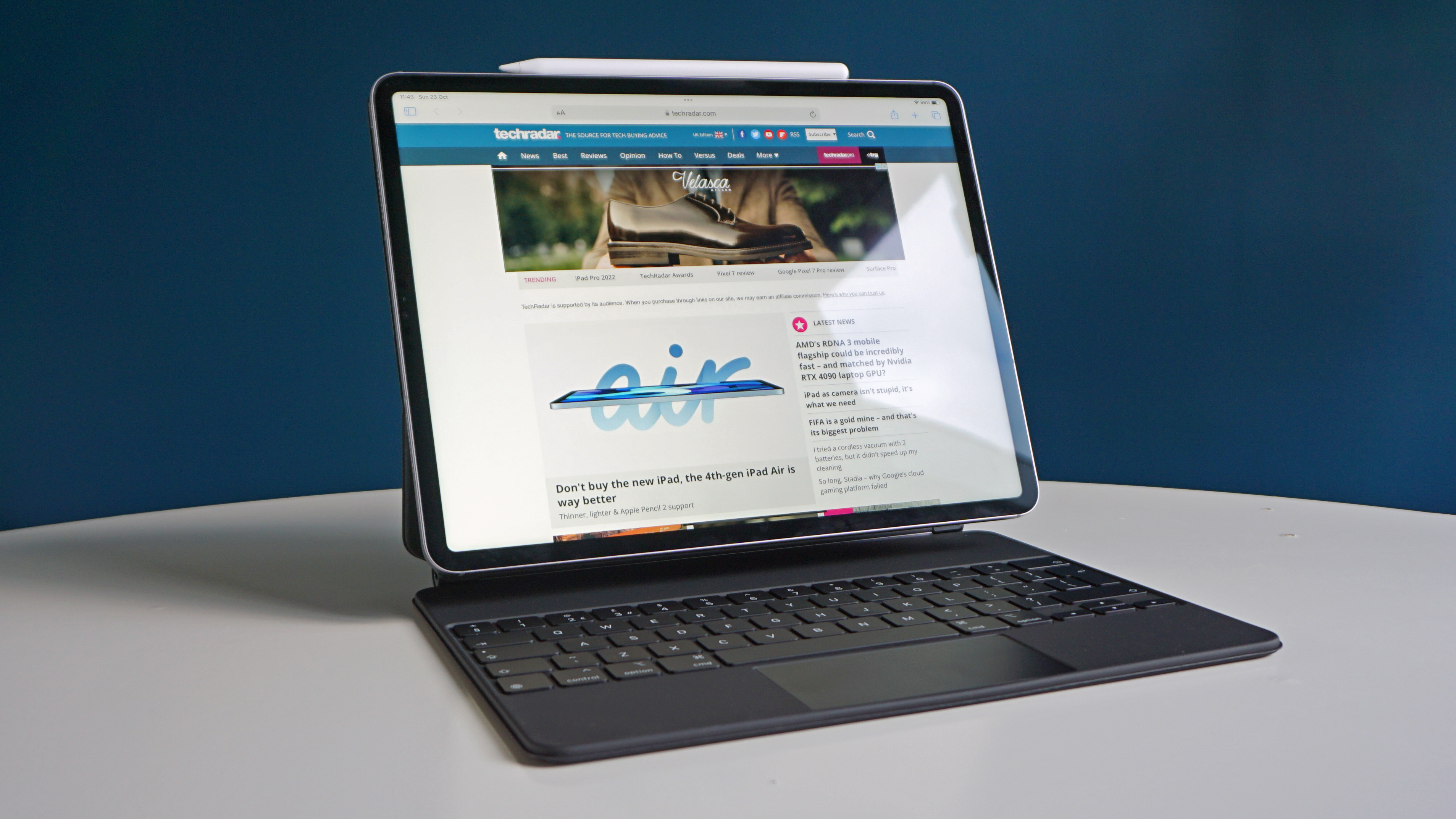Apple iPad Pro could be thinner and slicker with new OLED screen
Future Apple tablets might really benefit from new OLED etching tech

Sign up for breaking news, reviews, opinion, top tech deals, and more.
You are now subscribed
Your newsletter sign-up was successful
Apple’s future iPad Pros could be thinner, lighter, and generally more premium, thanks to new OLED screen technology being developed by LG and Samsung.
That's according to a report from The Elec, which claims that both LG Display and Samsung are working on fancy new OLED etching tech which could one day be used in the best iPads. It's not yet clear when the iPad Pro will benefit from this development, but it could be as soon as next year.
We've previously reported that iPad Pro models could get OLED displays in 2024, with both LG and Samsung said to be producing panels for Apple to use. These reportedly have a two-stack design, meaning there’s a pair of light-emitting layers in the screen, not just one. They're known as hybrid panels, and are a compromise between cheaper (standard) rigid panels and expensive flexible ones.
These hybrid panels use a combination of a glass substrate (like a rigid screen, which consists of two of these) and thin-film encapsulation, or TFE (as seen with a flexible panel). However, right now that glass substrate layer must be moved during the manufacturing process on the production line.
That’s problematic, due to the thin layer breaking in some cases – whereas the new etching process will enable everything to be done in one go, making it safer for the manufacturer and allowing for a thinner panel (and therefore iPad).
The caveat to all of this is that LG Display reportedly won’t be using this new tech until its first Gen 8 OLED line. For the iPad Pro models rumored for next year the current Gen 6 OLED line will be employed – which means we won’t get these slimmer panels until the following generation after the 2024 models.
Or will we? Because Samsung Display seemingly started work on this new etching process earlier than LG, and The Elec’s report contends that it will be immediately applied to iPad OLED panels on Samsung’s Gen 6 line. So, the suggestion is that next-gen iPad Pros might just benefit from these thinner and fancier screens after all.
Sign up for breaking news, reviews, opinion, top tech deals, and more.
Analysis: how far off is the dream screen?
Okay, so if we are to see these super-slim screens in the next iPad Pros – at least for the panels Samsung makes with this reported new etching process – how would that work? Might the larger next-gen iPad Pro get these panels, but not the smaller?
It would certainly make sense for the bigger of the tablets to get the upgrade first, because the rather hefty iPad Pro 12.9 has more to gain from a thinner screen.
Confusingly, though, a previous report from The Elec (two months back) claimed that Samsung is only developing 11-inch OLED screens for Apple, whereas LG is handling both 11-inch and 13-inch. Although in the future, The Elec reckons, that could change, with Samsung making both types.
Ultimately, this is a lot of whispering on the grapevine, so we need to be very cautious about how much stock we put in the idea of a thinner panel for a next-gen iPad Pro. What seems to be clear enough here is that the slimmer screens are coming, they just might not arrive next year.
Whatever take on OLED manifests in the end, there’s a worrying possibility that next year’s iPad Pros could be considerably pricier. The two-stack design OLEDs are considerably more expensive than current screens, and that cost is bound to be passed on to the consumer in the form of more expensive iPad Pros.
The good news is that the displays are not just much brighter than single-stack panels, but they last longer, too – making for high-quality OLEDs with plenty of longevity. Having them thinner on top of all that would certainly make for an impressive salvo of upgrades on the screen front.
Darren is a freelancer writing news and features for TechRadar (and occasionally T3) across a broad range of computing topics including CPUs, GPUs, various other hardware, VPNs, antivirus and more. He has written about tech for the best part of three decades, and writes books in his spare time (his debut novel - 'I Know What You Did Last Supper' - was published by Hachette UK in 2013).